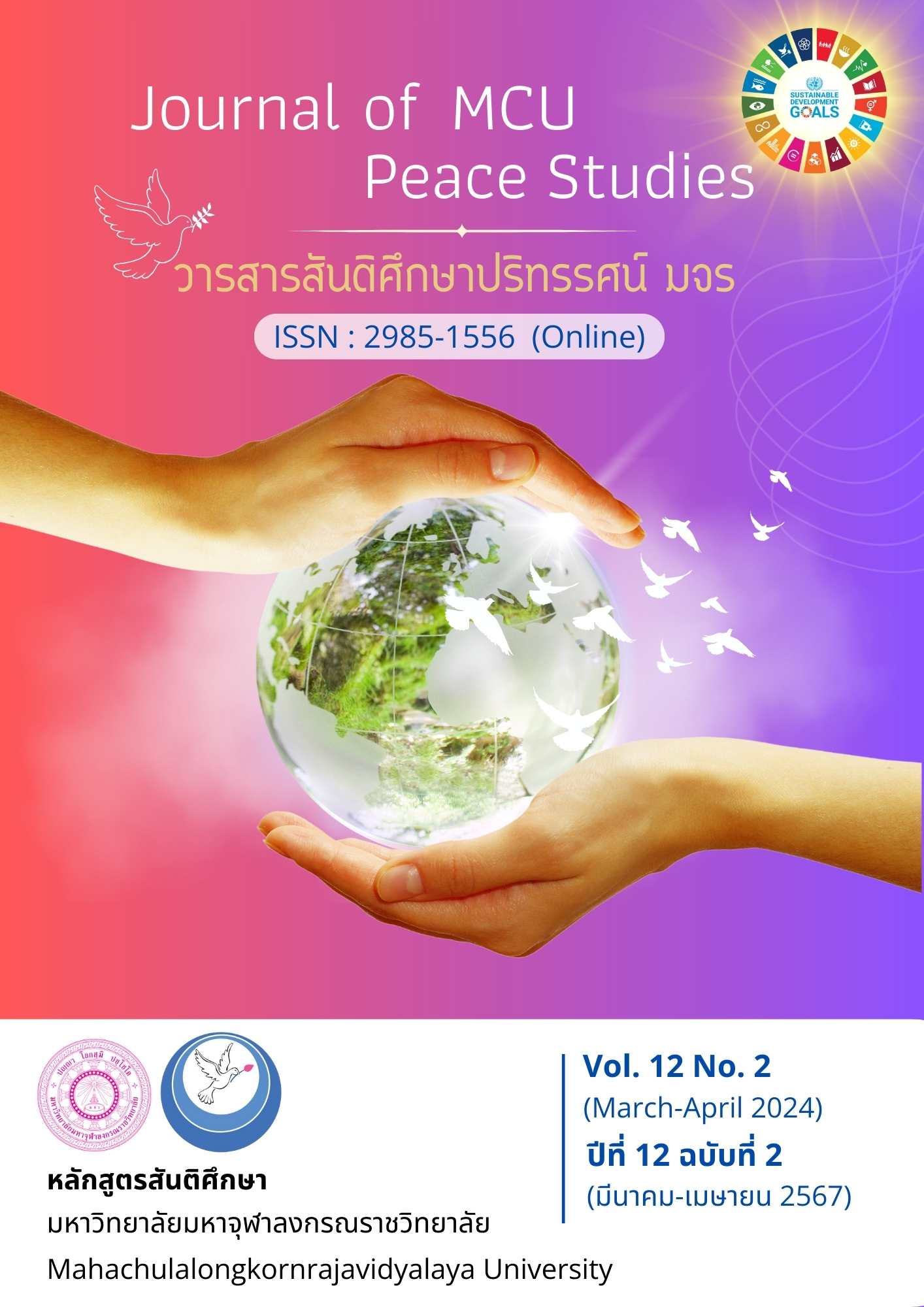Mindfulness Cultivation Process in Daily Life through Mindfulness-Based Coaching
Main Article Content
Abstract
This dissertation consisted of the following objectives: 1) to analyze context, condition, problems and needs of people in Wat Mai Yai Paen community in terms of cultivating mindfulness, as well as concepts on cultivating mindfulness in daily life through mindfulness-based coaching according to modern science; 2) to analyze the Buddhist peaceful means to develop and present the process of cultivating mindfulness in daily life through mindfulness-based coaching; and 3) to develop and present mindfulness cultivation process in daily life through mindfulness-based coaching for people in Wat Mai Yai Paen community. In the study, action research was conducted through field research and collaboration under the Bowon power (villages, temples, schools). Data were also collected through documentary research, participant observation, and in-depth interviews. The process was analyzed before being used to develop the target group to achieve Buddhist mindfulness cultivation integrated with modern science. As a result, the tools for cultivating mindfulness through mindfulness-based coaching were obtained, resulting in a concrete practice that was successful according to the objectives.
From the dissertation, the following results are found: 1) The problems of Wat Mai Yai Paen community are caused by economic situations, which cause conflict among family members, impacting to mental health, leaving them unable to handle problems and lacking mental instability. As a result, the mental development of people in the community is required through mindfulness cultivation, which will result in good inner well-being. 2) The mindfulness cultivation in daily life should be based on Satipaṭṭhāna (the four foundations of mindfulness), namely mindfulness as regards the body, feelings, mental conditions, and ideas. Whenever there are conditions that give rise to suffering, mindfulness will examine suffering by identifying the origin of suffering (samudaya), the cessation of suffering (nirodha), and the path leading to the cessation of suffering (magga). Followed by integration with Bhāvanā (four developments) to understand suffering as it really is through the use of wisdom. 3) From developing and presenting mindfulness cultivation process in daily life through mindfulness-based coaching for people in Wat Mai Yai Paen community, the activity called ‘cultivate mindfulness and build happiness for success’ was adopted to develop the target group. The results reveal that the designed process is effective as there is a behavioral change evidently. A body of knowledge obtained is ‘growing a tree of mindfulness’ model, which promotes mindfulness cultivation in daily life. A model consists of the following five aspects: (1) physical cultivation, which refers to loving and having compassion for oneself, as well as recognizing one's value; (2) moral cultivation, which refers to a good conduct, both in speech and action, in order to benefit oneself, the communities, and society; (3) mental cultivation, which refers peaceful mind and inner well-being; (4) intellectual cultivation, which refers to self-realization through wisdom; and (5) kalyanamitta coach, which refers to a good company who assists a person in cultivating mindfulness.
Article Details

This work is licensed under a Creative Commons Attribution-NonCommercial-NoDerivatives 4.0 International License.
Views and opinions expressed in the articles published by The Journal of MCU Peace Studies, are of responsibility by such authors but not the editors and do not necessarily reflect those of the editors.
References
Department of Mental Health, Ministry of Public Health (2007). Thai Mental Health Indicator Version 2007. Retrieved April 1, 2023, from https://dmh.go.th/test/thaihapnew/thi15/asheet.asp?qid=1
Elizabeth, H. (2022). Mindfulness-based Stress Reduction vs Escitalopram for the Treatment of Adults with Anxiety Disorders. Retrieved April 3, 2023, from https://ctc.georgetown.edu/elizabeth-hoge/
Kanjanataweewat, C. (2022). A Model of Developing an Ideal Leader Coach in Peace by Buddhist Peaceful Means. (Doctoral Dissertation). Mahachulalongkornrajavidyalaya University. Phra Nakhon Si Ayutthaya.
Mahidol University. (2018). Health Information Bangkok Noi Model Project. Retrieved August 3, 2022, from https://bangkoknoimodel.com/ลงพื้นที่เก็บข้อมูล/ลงพื้นที่เก็บข้อมูลสุข-5/
Phra Brahmapundit (Prayoon Dhammcitto). (2019). Religions and Sustainable Development Goals. (2nd ed.). Bangkok: Amarin Printing and Publishing.
Phra Paisal Visalo (Wongworawisit). (2008). Chalard Tum Jai. (3rd ed.). Bangkok: Med Sai Printing.
Phrakrupalad Pannavoravat (Hansa Dhammahaso). (2022). Sciences and Art of Creating True Happiness. Retrieved August 3, 2022, form https://online.fliphtml5.com/jbbzk/wswo/#p=12
Phramaha Hansa Dhammahaso (Nithiboonyakorn). (2018). The Integration of the Knowledge in Field of Peace for Developing Peace Building Process in Thai Society. Journal of MCU Peace Studies, 6(3), 1254-1266.
Thaisriwichai, T., & Phuchareon, W. (2019) The WHY of Coaching. Bangkok: Amarin Printing and Publishing.
Thongpae, W. (2019). A Development of Self Coaching on Contemplative Education Training Program for Instructional Chang of Students Intern on Teaching Profession. Journal of Humanities and Social Sciences Valaya Alongkorn, 14(1), 302-314.
World Happiness Report. (2022). Happiness Score. Retrieved June 1, 2022, from https://worldhappiness.report/ed/2022/


